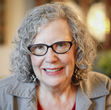N.J. Lindquist's Blog
September 2, 2025
Seven Long Years Since My “Routine” Mammogram
Today, I feel able to let everyone know that since this the middle of May, I've begun to feel that my brain is actually working again, and I've got some energy.
My journey began with a routine mammogram on August 16, 2018.
The lump was so small even the surgeon couldn't feel it. But it was deadly.
I had surgery for my tiny lump in October of 2018, and in early November, I learned that it was triple negative breast cancer. Which meant chemotherapy and radiation and a few other things.
All in all, I was super tired and I had very little brain for the next two years.
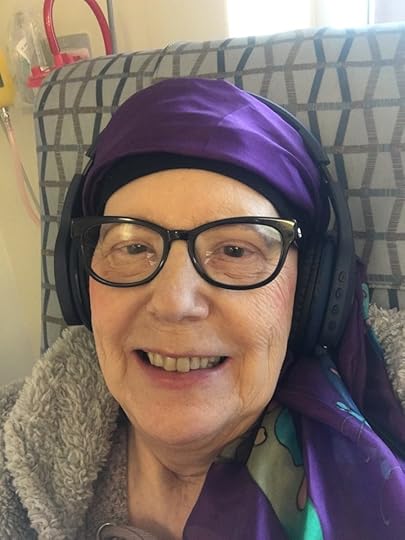
Me at one of my chemotherapy sessions.
CovidThe first week of January, 2021, before we had the vaccines and while I was trying to be being super careful, I managed to get two different strains of Covid within three months (the first was the fiery sore throat, the second just the gernal "not feeling good" kind). I got the first after getting a pelvic X-ray in a small medical clinic. I managed to stay in my bedroom and I didn't give it to anyone else
The second came from our veterinarian son who didn't know he was getting it when we had Easter dinner together, and had likely picked it up at work. Les also got it.
The two episodes left me feeling super tired and with even less brain than before.
Heart Issue #1I was actually at an appointment with my oncologist when my blood pressure and heart rate went too high and he sent me to get an ECG and then to Emergency where I had more tests and then I was assigned to a cardiologist who sent me for even more tests. That resulted in my having to take a blood thinner and a beta blocker. Those, especially the beta blocker, just kind of snatched any energy I had left. A few months later, I had an ablation for a heart flutter on the right side of my heart, but I'm still on the medications.
The Mayo clinic describes Cardiac ablations as a treatment for irregular heartbeats, called arrhythmias. “Cardiac ablation is most often done using thin, flexible tubes called catheters that are inserted through a blood vessel.” (Mayo Clinic)
In my case, on August 18, 2021, we went to the Newmarket hospital (Southlake) where catheters were inserted in my upper right thigh. It uses heat or cold energy to create tiny scars in the heart. The scars block faulty heart signals and restore a typical heartbeat.
Heart Issues #2 and #3I had another episode in early September, 2023 (irregular heartbeat, high BP, etc.), which led to an atrial ablation on the left side of my heart in March, 2024.
It seemed to have worked for a time, but after two more episodes and visits to Emergency in 2024, I had another atrial ablation (this time on both sides of my heart) on New Year’s Eve, 2024.
In between these major things, I've lost count of the number of doctor visits, ER visits, dental procedures, blood tests, stress tests, ultrasounds, minor issues (like ankle sprains), and so forth.
If you're wondering if the radiation or the chemo or the Covid could have caused my heart problems, either one of them could have. A nurse I talked to during my last ablation voted for the radiation since my cancer lump was on the left side. But no one really knows. It might have happened even without the other things.
To sum up, ever since the chemotherapy started in December, 2018, I’ve been tired all the time, and while I could think of many things I wanted to do, when it came down to it, I just didn’t really care if I got to them or not.So, basically, I’ve been happy if I got dressed every day and went for a walk, remembered to eat and drink and take my pills and vitamins, wash and hang up my clothes, water my plants, buy birthday gifts for our grandkids, and talked to Les intelligently now and then. He's been my sole caregiver during this time.
Mostly, I’ve read many, many books. Some new paperbacks or hardcovers I bought or got from the library, but mostly eBooks. Speaking of which, I’m so glad that I have my Kindle and our library has both Libby and Hoopla account because otherwise I couldn’t have afforded to buy all these books.
Les and I also tend to watch a few TV shows in the evenings, mostly mysteries or comedies on Acorn or Brit Box. And we’ve watched a lot of curling games, tennis, baseball, swimming, skating, and other athletic events.
I've also done puzzle after puzzle on my standing table, often while watching TV. I had a lot of 1,000 piece jigsaw puzzles, some from as far back as 40 years ago, but I’ve bought some new ones and family members have given me some. (I plan to blog about why I love jigsaw puzzles one of these days.)
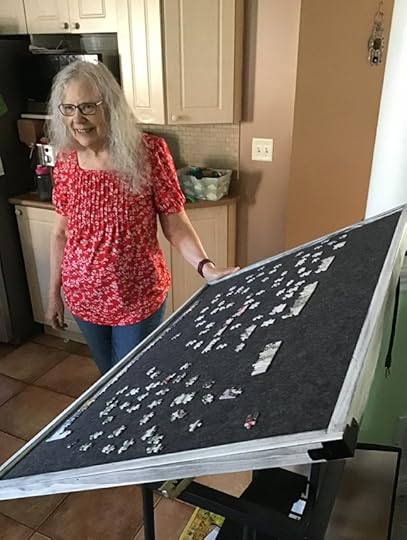
I’ve tried to keep reasonably fit by walking almost every day, doing exercises that my physiotherapist recommends, and Pilates or dance (with an app called Body Groove).
One ironically good thing about my not doing much writing over the last years is that I haven’t been spending all day on the desk top computer, so my back hasn’t been bothering me nearly as much as it was. I have had some random right knee and right arm pain, though, which my physiotherapist thinks the ablations might have caused. Always something!
I’ve been doing some work in the yard, which is basically now done in English country garden style. Backyard as well as the front.
We actually started with the backyard 12 years ago and completed the front over the last few years ago. Les and our two older grandsons have done most of the digging and the planting, but I did the research and chose what plants to get and I do most of the deadheading and so forth. We have a lot of bee- and butterfly-friendly flowers. Les and I have shared in the watering. I have indoor plants as well, including a number of pots of sansevieria, all of which came from three original ones we bought a few years ago.
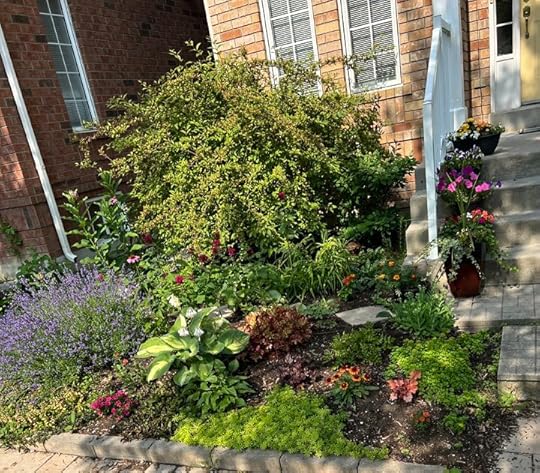
Front north side of our house.
Today, September 2nd, 2025What I haven’t done since 2018 is go to a mall or any physical store or event; do any cooking or more than a little cleaning up when Les was away or when he had rotator cup surgery; and have anyone over except for occasional family members. I also haven’t taught a workshop, written anything except a short prequel to a book I wrote years ago and a few blogs, or even cared that I wasn’t doing anything. And I've drive the car maybe 5 times in those years.
The one thing I HAVE donesince 2021 is to mentor one writer, using virtual meetings, thanks to The Writers Union of Canada, which offered grants for mentoring. the grants gave me an excuse to ask a superb writer who has several pieces in our Hot Apple Cider Books if she needed help. The plan is for her to have a book out in October and another one in February of next year. She’s pretty well the only person I’ve spoken to aside from doctors, our dentist and physiotherapist, family members, and a couple of neighbours I often meet when I’m out walking.
The “new” and good news is that in the middle of May, I started to feel a little bit like myself. In other words, I had a little energy and a little brain for a week straight. I waited a few weeks to see if it continued before I even told Les because, in the past, I’ve had energy for maybe a day or two at a time, but then it would be a week or more with no energy at all. But, right now, most days I still wake up in the morning with some energy and some brain. I really hope that’s going to continue.
I wore a Holter monitor for 2 weeks in April and again in July and they didn't show any issues. I'll do the same again in December. Hopefully, I won’t need another ablation. I’m still on the blood thinners and beta blocker, though.
Because my brain has still been kind of sporadically here, the other thing I've done over the years is to be somewhat active on social media, mostly posting pictures (of plants!), and commenting on or reposting what other people have said. Should you want to connect there, I’m on Facebook, Instagram, Threads, Bluesky, Mastodon, and (recently) Substack as N. J. Lindquist.
Despite my rather complicated journey, I urge every woman to get a regular mammogram. If you’re clear, you have lost nothing. And it they find something, you have a good chance of fighting it.
Should you want to read more about the cancer and heart issues in the last seven years, click on this link. https://njlindquist.com/blog/breast-cancer/
The post Seven Long Years Since My “Routine” Mammogram appeared first on N. J. Lindquist.
August 13, 2025
Remembering My Friend, Martin
Since there's a memorial event this Saturday, I felt I needed to post something about our brief but very beneficial relationship.
Many people remember Martin Smith for his contribution to Canadian Gospel music and for his plays and work in the theatre. But few people know how instrumental he was in promoting Canadian writers who are Christian in Canada.
I was so sad to learn that Martin, who was the President of the Gospel Music Association of Canada and an extraordinary person, passed away in June.
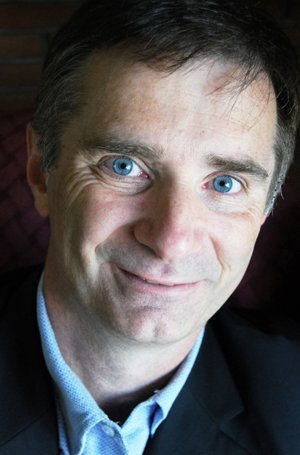
Martin’s picture in our Hot Apple Cider books
I met Martin years ago at a Christian Booksellers Conference in Canada. I was there helping an artist set up her booth. (I’d met her in 1994 when I was asked to write an article on her for ChristianWeek.)
It was my first time at a conference like this, and I spent most of my time wandering around looking for books by Canadian authors. It became a bit of a joke, because I had a really hard time finding any. I had arrived expecting the Canadian authors to be front and centre, and instead they were hidden, if there at all. I did manage to find a Sigmund Brouwer book, and two men in suits scoured their booth to find Linda Hall’s new book August Gamble. One of them finally found it on the bottom, back side of a tall metal turning stand. I had the impression that he wanted a prize for finding it.
And then there was Martin Smith, who was working for a music distributor which, of course, included many American singers. But he and Eric Spath, who was also working for the distributer, were actually promoting Canadian singers, too!
After that conference, I bumped into Martin at other events, and we talked about the need for more promotion for both Canadian musicians and writers who were Christian.
Then, in March, 2007, at a Christian conference in Toronto, I had a conversation with Eric Spath, who was now working with World Vision Canada. He had actually come to The Word Guild’s Write! Canada conference the year before looking for authors who were also speakers for a Girls Night Out program World Vision Canada had begun.
For some reason, Eric showed me a book they were giving out at the Girls Night Out events. It was an American book, and I won’t say the title, but it made me gag. I was pretty sure it was being given out because it wasn’t selling as well as expected.
I said, “What if we could give them a book with Canadian writers in it?”
Eric shrugged. “We’d need 30,000 books by January.
“Let me think about it.”
I wandered around the booths, my head spinning. How on earth could we get 30,000 books by Canadian writers in that short a time?
I knew how to create books. In 2000, I had republished a young adult book that had been first published by Moody Press in 1991. And I’d written and published four additional ya books. But it was hard work. And how would we fund it? We’d be giving the books away, not selling them.
I ended up at the table where Martin Smith was sitting alone. Since no one else was around for the moment, I told him about my conversation with Eric. He was supportive and encouraging. He mentioned the compilation CDs that were sitting on the table in front of me. I picked one up and examined it. Ten songs by ten different Canadian artists.
What if?
I looked up at Martin. He had a questioning look in his eyes.
“We could do this!” I said. “Stories. True or fiction. A few poems. Kind of like Reader’s Digest. A compilation. By Canadian writers!
Martin was grinning. “That would be terrific!”
I won’t go into the details here about how the books came into being. That’s another story. But I just wanted to emphasize that without Martin, the 30,000 copies each of Hot Apple Cider and A Second Cup of Hot Apple Cider that went out at Girls Night Out and Couples Night Out events, as well as the books sold in stores and by the authors, not to mention the later copies of A Taste of Hot Apple Cider, Christmas with Hot Apple Cider, and Hot Apple Cider with Cinnamon, would likely never have happened.
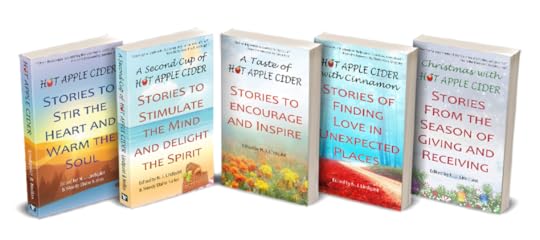
These are the current covers, not the original ones.
The bonus for us, and Martin, was that he ended up having stories in both Christmas with Hot Apple Cider and Hot Apple Cider with Cinnamon. Stories filled with his gentle humour, I might add. In fact, his story “The ‘Other’ First Prize” in Cinnamon opens the book.
Martin’s memorial service is this Saturday, August 16, from 2 to 4 pm at The Sanderson Centre for the Performing Arts, 88 Dalhousie Street, Brantford, ON.
In his honour, we’ve just made the ebook version of Hot Apple Cider with Cinnamon available for $0.99 until the end of the month. (The price might not have changed yet, but it will.)
(Click here for more information about Hot Apple Cider with Cinnamon and links to get the ebook at Kindle, Kobo, iBook, and Nook.)The post Remembering My Friend, Martin appeared first on N. J. Lindquist.
January 27, 2025
When a Country is Divided
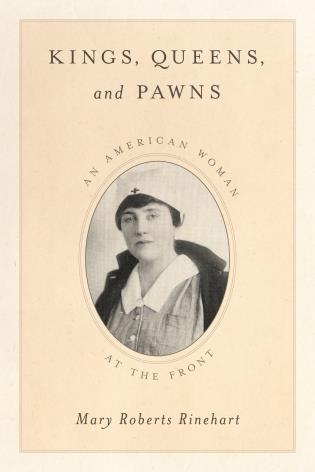
A few years ago I read a book by American author and journalist Mary Holt Reinhart, who not only wrote great mystery novels but was a war correspondent on the front lines during World War I.
She made it very clear, in several novels as well as in her journalism, that many people in the US, both before and during World War I, were pro-Germany. As in, pro-Nazi.
Many, but not all, were workers, and they were led by agitators who either lied to them or fudged the truth.
Yes, that sounds a lot like what we're experiencing today. Not only in the US and canada, but in many countires around the world. Lie after lie.
I highly recommend Mary's autobiography about her experiences in Europe as a war correspondent - Kings, Queens, and Pawns: An American Woman at the Front.
The post When a Country is Divided appeared first on N. J. Lindquist.
January 4, 2024
I Know Who Holds the Future*
Since it's the beginning of a new year, I rememberd an article I wrote some years ago for a women's magazine. They had wanted something positive to begin the year. 23 years later, I decided to republish the article here.
I was four when my parents told me I was adopted. For the next 46 years, I wondered who I “really” was. But I didn't do anything to find out.
Now, my adoptive parents were good parents and I have no complaints about my life. But I couldn’t help wondering. Were my birth parents alive or dead? Why did they give me up to be adopted? Did I have any siblings? What was my ancestry? Was there someone else like me out there somewhere?
Like most adopted children, I occasionally daydreamed. What if my birth parents were famous people who had given me up because they couldn’t look after me? Maybe they missed me terribly and would appear one day to shower me with gifts. What if they were horrible people, and they'd turn up and try to take me back?
From the beginning, though, even when I was very small, I firmly believed that God had put me where he wanted me. I don’t know why I felt that way. My parents attended church but didn’t have a close relationship with God. I did, however, have a grandmother and several aunts and uncles who prayed a lot and talked to me about God. And I loved going to Sunday school and singing songs like "God Sees the Little Sparrow Fall" and "Jesus Love the Little Children."
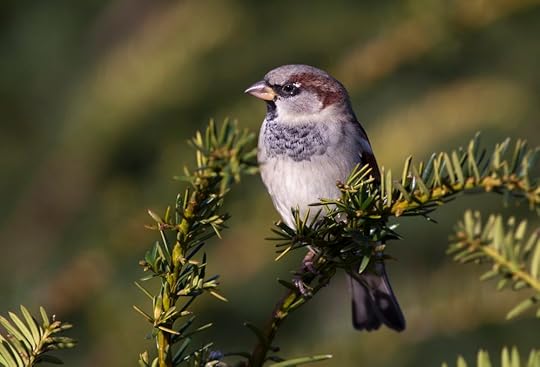
Perhaps because of my grandmother and my other relatives, or perhaps because I've always felt different from other people, I’ve been talking to God ever since I was a child. And always, when I wondered about my past, and who I really was, God would tell me it was okay—it was all under control.
Even after leaving home, getting married, and having four sons, I did nothing to find my birth parents. Perhaps because along with the nice daydreams there was also fear—what if they were horrible people and they were in jail? Or worse— Anything was possible....
But when my first grandchild was born, and my son asked me about my medical history, I suddenly realized this wasn’t only about me. We all needed more information.
So, after doing some research and telling myself to "Just Do It," I contacted the post-adoption agency in the city where I had been born. Within weeks, I knew my parents had been a very young unmarried couple. I also learned that my mother had written them recently saying she wanted to get in touch with me….
Ten years have passed. I’ve met both my biological parents. And I’ve learned that my birth was the spark that led my biological mother to give her life to God. Since then, she’s been a missionary and a pastor’s wife for over 50 years. And during that time she prayed for me daily, and believed that because God had been faithful to her, he would also be faithful to me.
All those times God told me not to worry—that it was okay—it really was.
Isn’t it funny? All that wondering, and in the end there was a simple explanation with ordinary people. And God was there the whole time, looking after each one of us, answering prayers, working things out for the best for everyone.
I believe that my adoptive parents were exactly the right people to raise me. The fact that I was able to help lead both of them into a relationship with God is only one of the wonderful things that happened.
When my biological mother became pregnant, it wasn’t seen as a blessing. Just the opposite. And yet she believes it was a blessing, even for her. God really can take any circumstance and bring good out if it.
Whenever I might be tempted to worry about what will happen tomorrow or next week, I simply have to look back at my past and say, “I know who holds my future; God has it all in control.”
*First published January 2010 in The Link and Visitor. Edited slightly.
Note: If you want to know more about my journey as an adopted child, and finding my biological parents, check out my memoir blogs here.
The post I Know Who Holds the Future* appeared first on N. J. Lindquist.
November 28, 2022
Thoughts About My Dad 30 Years After His Death
Thirty years ago today, I sat in a hospital room in the palliative care section of Brandon Hospital watching as my father gently passed into a different world.
A doctor first suggested he might have lung cancer a year before, but then they decided he didn't. But in October of 1992, they changed their minds. He did have lung cancer after all, and it was inoperable.
I flew from Toronto to Brandon for a week in the latter part of October. I soon realized that my mother was unable to cope and in denial most of the time. Because we lived so far apart, I hadn't realized that she was slipping into dementia and Dad must have been looking after her.
I flew back home to spend a week getting things organized for Les, our older two sons who were in high school, and our 3-month old puppy. Then I'd flown back with our younger boys, who were still being home-schooled.
While I was gone, Mom had called 911 for help when Dad had fallen, and they'd put him in the hospital. The cancer had gone into his spine and was now spreading all through him. He had no pain other than an occasional headache, and all he needed was an aspirin or other low-key painkiller.
When I walked into the hospital after dropping the luggage and boys at the apartment, Dad was sitting in a recliner chair in a small sitting area. When he saw me, he immediately said, "Nancy, why am I here?"
I pulled a chair up in front of him and said, "It's the cancer, Dad. It's spread."
"Then I need to do something." He immediately closed his eyes and ask God to forgive him for his sins and to look after him, using language I knew came straight out of his mother's pleas to him, both spoken and written.
The change was apparent in the peaceful look on his face and the relaxed lines of his body. He shook his head, clearly puzzled. With the innocence of a child, he asked me, “Why did it take me so long to understand?”
I said, "I don't know, but I'm glad you do."
I took him back to the ward he was in, with three other men, all younger than him. He soon fell asleep, and as I watched him, I thought of his mother, who I called Granny Shaw. She had died 34 years earlier. A devout follower of God, my grandmother prayed daily for each of her ten children and for their families. Many of them did make a commitment to God, but not her second youngest—my father—or his wife. But Dad had remembered her words.
Our younger two boys were 12 and 8, so I brought them with me to the hospital for a short visit a few times, but mostly I left them in the apartment doing their schoolwork, playing card games, or watching TV while I sat with Dad. Mom didn't mind having them there.
During the next ten days, George and Bernice, a couple who were younger than Mom and Dad but very close friends of theirs, drove Mom back and forth to the hospital, took her shopping as needed, kept her from getting too upset, and made sure she was eating. I spent most of my days at the hospital. When I found out Dad had fallen while trying to get out of bed in the night to go to the bathroom because he didn't realize his legs no longer worked, I hired a nurse to be with him nights.
When I was certain Dad was asleep for a bit, I went back to the apartment or did some necessary running around. A few years before, Dad had made sure I had power of attorney for both of them. Because Dad's files were completely up-to-date, it was easy for me to get copies of the power of attorney from his lawyer, close bank accounts, start to organize a funeral, write an obituary, and take care of everything so Mom had nothing to worry about. Their friend, George, was again invaluable in this process.
Other friends and relatives of Mom and Dad's also stopped by, brought meals for us, etc. One thing Mom and Dad never lacked for was genuine friends.
Since I'd never had the experience of being with someone when they died before, I had a lot of questions about it, but no idea who to ask. (I've never liked asking questions.) There was a small sitting room for visitors that I went to occasionally when the nurses were in Dad's room. One day, I found what appeared to be a textbook for nurses sitting on a table. I looked in the back for a glossary and found a section on what happened when someone dies. Just what I'd been wanting! It was quite helpful.
So when the nurse asked if we'd like them to move Dad into a private room, I knew the end was coming.
On the morning of November 27th, I came into his room and found him lying there, his head raised slightly, smiling. I asked why he was smiling and he said, "I'm just glad." That was our last conversation. Shortly after that, Dad went to sleep and he didn't wake up. On November 28th, as I sat by his bedside waiting for him to draw his last breath, I was filled with the sense of God’s presence, watching over both of us. What could have been a difficult time became an interlude of joy and peace that, as Jesus said, passed understanding. And, thankfully, when he died I recognized the signs and was able to calmly go and tell the nurse that he was gone.
My dad's older brothers taught him to smoke cigarettes "out behind the barn" when he was eight years old. When I was younger, he was smoking at least a pack a day (although never when he was around his mother). In his late 40s , he happened to be watching TV when a documentary came on about smoking and what it does to your lungs. He never touched another cigarette. Yes, he died from lung cancer, but it might have happened years earlier if he hadn't just happened to see that documentary.
Anyway, what I most want to say is that my dad was a really good dad who had limited education and limited opportunities, but always did his best to look after his family, including not only his wife and daughter but also his mother and other older relations. He was the one person I knew I could always rely on if I ever needed help, and he adored his four grandsons and they loved having him around. I can't even imagine how thrilled he'd be to meet his great grandchildren. But perhaps he's somewhere smiling down on them right now.
And, to end with some happy notes:1. Two years earlier, on Oct 19, 1989, Dad was sitting in our family room with Mom and our whole family, watching the Bill Cosby Show. That episode was titled, "Theo's Gift," and it talked about dyslexia. My dad struggled his entire life with difficulty reading and writing, and had been called "stupid" more than once by a teacher. When he had to write a letter, he got Mom to do it. He read every day before he went to sleep, but very slowly. Mostly Reader's Digest, maybe a western or another fairly easy book. He also read the local weekly newspaper and sometimes the bigger daily one. Anyway, on the show, when they talked about the problem Theo had, my dad got to his feet and pointed at the screen. "That's me! That's what I have! The ending of words keep changing!" Finally, my dad received validation that there was a name for the condition he had, that it could affect anyone, and that it had nothing to do with how smart you were.
2. In the spring of 1991, my first book, Best of Friends, was first published (by Moody Press). Dad was so proud that I had written a book and even though it was a young adult novel, he read it more than once. I'm so glad he was around for that.
3. The only sport I ever saw Dad play was golf (which he played as often as he could). But the sport he most loved to watch was baseball. Sometimes he took me with him to Souris Cardinals' ballgames. And when I was younger we always watched the World Series together on our TV. (Usually featuring the Yankees, as I recall.) When Toronto got it's own team, he was thrilled and he quickly became a Jays fan. We took him to a few games when he was visiting.
On October 24th, 1992, during my first week in Brandon, and before they realized Dad needed to be in the hospital, we watched the Toronto Blue Jays in game 6 of the 1992 World Series. Mom had gone to the bedroom because she found most sports boring, but Dad and I watched every pitch, every strikeout, every hit.... And we celebrated together when the Jays won. I'm so glad we had that moment together.
4. I have to admit I'm not really a "griever." After I realized he was dead, I didn't shed any tears. I went back to the apartment and told Mom and George and Bernice, called Les, organized the funeral, sent the obituary to the places where Mom wanted it, did all the things you do...
Les and our older boys flew down. I had realized Mom couldn't be on her own, so we'd arranged for her to stay with her younger sister in Winnipeg for a few weeks and then fly down to stay with us for a while. Once we were back in Toronto, we got back into our usual lives again, with additional shopping and moving things around to turn our family room into a bedroom for Mom when she arrived right after Christmas.
5. Just before Christmas, one night I felt I had to write a story. It was about a man in a ward with three other men in the palliative care wing of a hospital. The story isn't about Dad or the actual men who were in the ward with him, but I have to admit that, being a writer, I did take quite a few notes when I was sitting there with not much to do. Anyway, I think I poured my emotions into the story. (It's called "Living on the Edge," it's kind of weird, and it's one of 7 stories in this book, which I published under a pseudonym.) I guess writers are funny people. Or maybe it's just me. But I think Dad would enjoy the story.
A Few Pictures.(Note, the one above was taken when dad was about 50.)
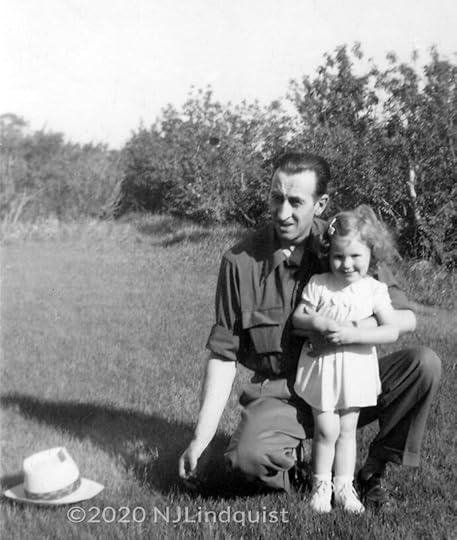
I Loved Being with My Dad.
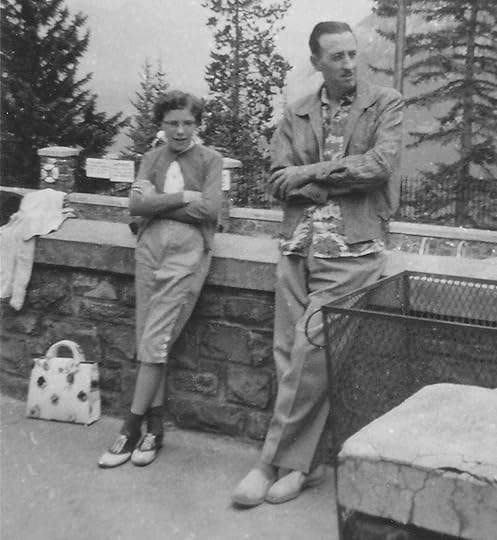
My Favourite Picture of Dad and Me. Taken While Visiting Banff.
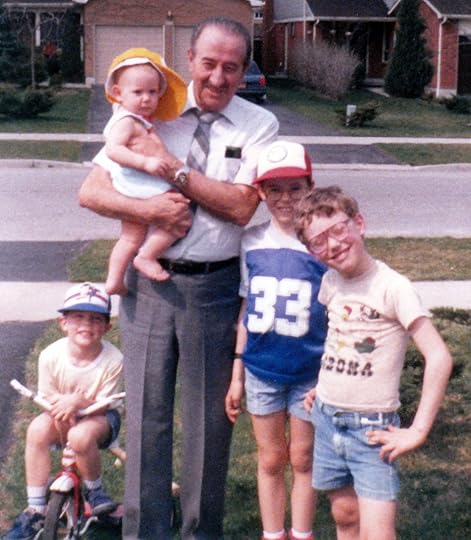
Dad with His Grandsons, 1984
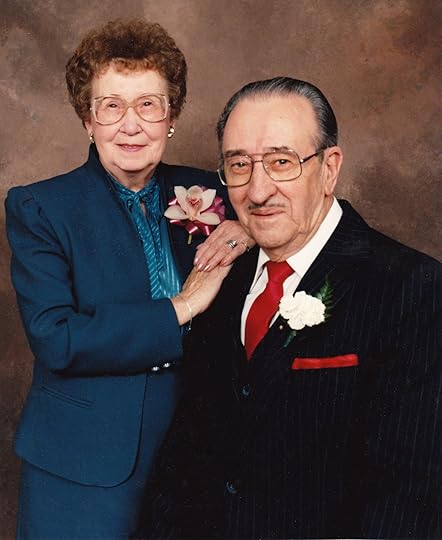
Mom and Dad's 50th Wedding Anniversary
The post Thoughts About My Dad 30 Years After His Death appeared first on N. J. Lindquist.
November 18, 2022
Why I More or Less Disappeared in the Fall of 2018 and What I’m Doing Now – Part 2 of 2
If you missed part 1, you can find it here.
As 2020 started, you were just beginning to feel halfway normal. And then the Covid pandemic began. How did that impact you?Actually, the first thing that happened in 2020 was that one of our sons moved in with us. He and his wife had separated, and since we live less than a ten-minute walk from their house, and we had room, it seemed easiest for him to move in with us.
Long story, but when we moved into this house in 2000, we had not only our three youngest sons with us, but also our oldest son, his wife, and their two young kids. They needed to be able to save money to get their own house and, by including them, we justified getting the house plan we really wanted. We also added an extra foot to the basement height to make the space more livable.
As soon as we moved in, Les and our oldest son got to work finishing the basement to make a kitchen/family room and small playroom for them, and they also had two of the bedrooms. They were with us about four years. The extra foot in the basement and the deeper windows made it a bright extra floor rather than the usual basement.
Anyway, because of that, it was no problem for our third son to move in. He could have the basement for himself and his three kids, then aged 1, 4, and 6. Plus, he had a second-floor bedroom for himself and the baby, and the older kids had their own room. Eventually, I moved my office out of the fourth "bedroom" to our living room so their youngest could have her own room.
Shortly after our son moved in, and just as I was beginning to have a bit more energy and brain, the Covid pandemic began and the world changed. Our son wore a mask when he came and went, as did the older two kids when they were here (roughly 50 per cent of the time), and we basically stayed away from them. Which was sad. But at that point, we had no choice. Neither of us wanted to get Covid.
When we saw our other sons and their families, it was mainly outside or wearing masks.
I did a little writing. Kept up with people on Facebook and Twitter. Tried to get out for a walk each day. And continued to read a lot. Les still did any necessary grocery shopping, but it was mostly ordering and pick-up. Any shopping I did (which was minimal) was done online and delivered, or Les picked it up.
At this point, you were starting to have more energy and thinking ability. Were you able to do anything with it?I was starting to have some energy and some "brain," but I was still far from what I call "normal me." My goals at this point were to walk as much as I could, eat healthy, not gain weight, stay away from everyone, read a few heavier (nonfiction) books as well as novels, and keep in touch a bit on social media. While there was a lot going on at this time in terms of world affairs, there was nothing I could do about them, so I just tried to be aware and get healthy.
And then, on August 16, 2020, I had the first of six scheduled doses of zoledronic acid recommended by my oncologist. Apparently, other than chemotherapy and radiation, it's the only treatment for people with triple-negative breast cancer. It had been pushed back for various reasons, including a dental implant I was in the process of getting when the cancer was discovered, and of course, the Covid pandemic. It was given the same way the chemo was, but in a much smaller dose. So I got the zoledronic acid in the morning and it took about 15 minutes total.
After lunch, because it was a beautiful day, I went for a short walk. A few blocks away from our house, I realized I didn't have my cell phone with me. What if I had a bad reaction? As I kept walking, I thought, Well, I can ask someone for help. Maybe knock on a door and get them to call Les. But do I know our number? Big sigh. Yes! Yes, I do! And then I thought, I could flag down a car and get them to drive me to our house. But do I know our street name and house number? Yes, I do know our street. But our house number... Even though we'd lived in the same house for almost 19 years at that time, I didn't remember the number.
I spent the rest of the walk secure that I knew our home phone number (literally the only phone number I do know), but desperately trying to remember our house number. It's hard to explain how that made me feel. I knew where I was and how to find our house, but I felt adrift. Like my brain had hidden a valuable piece of information on me and I couldn't find it.
When I got back home, I went to the front door and looked at our house number. Oh, yes, of course. But ten minutes later, when I told Les about the incident, the number had been erased from my brain again. And for a solid week, I had difficulty remembering it.
I really don't know if that episode was a coincidence or not, but before the week was over, I was once more swamped with lethargy, brain fog, and apathy. Some days, I had a little energy but no brain; some days, I had a little brain but no energy; some days, I had neither; and the odd day, I had both some energy and some brain. I loved those days, and always hoped they’d stick around. But they never did.
Did you have another zoledronic acid injection?I was scheduled to have the second zoledronic acid in February, but Covid was delaying appointments, and that kept me from getting it until April, 2021. To be honest, I wasn't at all sorry it was postponed. But I did feel I should try it again.
So there I was in my oncologist's office the day before I was due to get the zoledronic acid. That's normal. They check your blood and the oncologist does a quick examination. But while the oncologist was checking my heart and lungs, everything went a bit crazy. I wrote a blog about it, but to summarize, my blood pressure went quite high and my heart began beating way too fast. My oncologist thought I could be having a stroke.
The good news is I didn’t have a stroke. The really good news is that because my oncologist immediately sent me to get an ECG, they discovered I had an atrial flutter, similar but not the same as what Les had had the year before.
The cardiologist I later spoke to on the phone (I have yet to meet him, but he's the same one Les had) sent me for some additional tests, and then booked an ablation. He also put me on blood thinners and beta blockers.
I actually did get the zoledronic acid a week later, and I didn’t forget my address this time. But by then I had lots of other things to think about. I was still trying to walk most days, but the beta blockers made me feel like I was walking through quicksand. Any energy I’d had was totally gone.
After a few weeks, I called my cardiologist and was able to convince him that I’d keep some beta blockers with me at all times (in my iPhone case) and I'd take one immediately if my heart started racing again. Whew! The blood thinners might be having some affect but nothing like the beta blockers.
Thankfully, in August of 2020, there was a cancellation, and I was called to come in for an ablation at Southlake Hospital in Newmarket the next day. As had happened with Les, a specialist cauterized the parts of my heart that were misfiring and causing it to beat too fast and with no effect.
So l’d now gone from the fall of 2018 to the fall of 2020 with very little energy and not much brain. (Whether the chemo or radiation caused the heart issues or the heart issues were what was really causing my energy loss, we’ll never know.)
I was hopeful that I’d finally get back to normal in 2021.
You mentioned “neuropathy” earlier. Did that stop at some point?I wish!
No, the waves of neuropathy continued unabated.
Well, that’s not quite true. They weren’t as bad as they were when I was still having the chemo. My nails were no longer falling off or threatening to. But the waves of neuropathy still came. The fatigue and post-Chemo brain were still there, too, although some days I felt almost "normal me."
By the way, when I say waves, I mean they go away for a while and then come back, kind of rolling in, first one symptom and then another. It usually begins with my toes hurting. Kind of a cramping feeling. Sometimes my fingers also hurt, but never as much as my toes. Then it moves to my left side where I had the tumor and the lymph nodes removed. Either it will just kind of ache or the whole side will suddenly seem to have a cramp—like you sometimes get in bed out of the blue, usually in a foot or leg. This usually happens when I’m sitting down, but sometimes when I’m in bed. From there, it often seems to move up into my jaw.
I should mention that my dentist is one of the few people I’ve seen on a fairly regular basis during the pandemic. Sometimes for actual issues, like a check-up, cavity, cleaning, and so forth, but sometimes because my jaw aches and I think something is wrong, but he doesn't see anything, and it eventually stops aching. So it might be part of the neuropathy.
In February of 2021, I even had enough energy, and I hoped I had enough brain, to apply for a Mentorship Microgrant from the Writers Union of Canada, which I've been a member of for many years. The program was giving $500 grants to 80 members who were either willing to mentor someone else or who needed help getting a mentor for themselves. I thought maybe I had enough brain and energy to share what I had learned with someone else, and I knew just the person I wanted to mentor. Fortunately, that worked out, and although the program was officially from April to the end of June that year, we're still in touch. (I also got a second microgrant this past spring!)
By fall, 2021, I was starting to feel not too bad. I was able to do some website updates, take some lessons about marketing books on Amazon, and create or buy new covers for a number of my books. I'd even managed to find enough energy to edit and publish a book I'd written for my second granddaughter years before. I was really hoping I'd soon be back to "normal me." But that didn't happen.
What did happen?Just before Christmas, 2021, I had two different things going on. My teeth on my right side (top and bottom) were aching, but we didn’t know why. My dentist booked me for a sort of ultrasound for teeth. They didn’t find any major problems so we didn't know what to do. I hoped/assumed it was from the neuropathy, which was still going on.
At the same time, I was pretty sure I had a urine infection, so I phoned our family doctor, and he gave me antibiotics. The weird thing is that the antibiotics seemed to affect my teeth, because the aching went away.
The need to go to the bathroom every five minutes got somewhat better, but a week after I stopped taking the antibiotics, the urine infection symptoms reappeared. This time, my doctor gave me a different antibiotic and also got me to go to the lab and leave a sample. The new antibiotic made me sick to my stomach but did nothing else, and the lab tests didn’t show an infection. The only problem was that I still had to go to the bathroom all the time.
So, on December 23rd, still without actually seeing me, my GP gave me another, longer, prescription for the original antibiotic and booked me for a pelvic ultrasound on January 4th.
On Christmas Day, we saw our oldest son and his family briefly, and then had a mini-Christmas dinner and opened gifts with our third son and our youngest grandkids at our house.
On Boxing Day, we did a drive-by visit to drop off presents for our two sons who live in Toronto. We also got to meet our youngest son’s girlfriend in person for the first time. (We’d “met” her in August via Zoom.) It was a quick trip since we didn’t plan bathroom stops anywhere. (Yes, I wore protection.) We dropped off gifts at their door for our second son's family because they were all sick and thought it might be Covid. We literally saw our son wave his arm through a crack in the front door and that's it.
It was kind of a sad Christmas.
So, 2022 began with a pelvic X-ray, right?Yes. And here’s where it gets really frustrating.
We were looking after our three youngest grandkids on that day because they were off school, so Les dropped me off at the medical building where they did the ultrasounds and went to get the kids a treat while they waited. (Aside: No, I haven’t been driving much for the last four years. I don’t trust my brain to stay focused or to have fast reactions.)
Anyway, I walked into the small building, which is mostly medical offices of some sort, got to the elevator, realized I didn’t have my mask on, and— Oops! I had forgotten to bring a mask!
I covered my face with my coat and hurried to the office where they gave me a "hospital" mask (aka pretty-well-useless blue one).
After the pelvic ultrasound (and a transvaginal ultrasound I didn’t know I was having), I left the building. (Did I mention that day was my birthday?)
Two days later, I woke up with the sorest throat I’ve ever had, and I didn’t leave my bedroom for the next week. We didn’t have RATS and I wasn’t going anywhere near Les, our son, or the grandkids, so I waited until I felt better.
Mostly it was just the sore throat along with my usual fatigue, etc. Les did get some tests on about the 6th day and I was negative, but I’m quite sure I got Covid while getting the ultrasound.
The good news is that the ultrasound test results were all clear. And yet, I still had what appeared to be a urine infection. So, a few days after I finished the antibiotics, I switched gears and treated it as a yeast infection (I always get one after antibiotics anyway). It eventually cleared up, but by this time I was basically running on empty in terms of energy and brain.
So, you've had Covid once, and it was just you?Twice, actually. After being super careful, always wearing N95 masks whenever we're near people, the one time we let down our guard, we got it.
On Easter Sunday in 2022, just as I was beginning to have a little energy and brain, our youngest son brought his fiancé up to our house for the first time and we sat around a table together with our third son and his three little ones.
Our third son woke up on Tuesday and didn’t feel well. He tested himself. Positive. He thinks he must have been exposed to Covid either from a client or a co-worker since masks were no longer required where he works.
Les tested positive the next day, as did our youngest son. I tested positive a couple of days later (although I got sick the same day as Les.) Instead of a sore throat, this time it was more like a cold or a flu and, of course, zero energy, brain fog, etc. We mostly hid in our respective rooms.
Fortunately, our son’s fiancé didn’t get it. Neither did our grandkids, who had gone back to their mother on Monday morning, before their dad got sick.
Since then, we’ve continued to mask and be careful. So far, so good. But with everything they’re finding out about Long Covid, it’s actually very scary. I could count on the fingers of my hands how many times I’ve been inside a store of any kind or a restaurant since in the last three years. Thankfully, our family has been very careful, too, for the most part.
The only “event” I’ve attended is our youngest son’s wedding, which had a total of 15 people in attendance—bride and groom, parents, the bride and groom's brothers, one sister-in-law, two friends of the couple (one with a spouse), and a photographer.
Have you been able to do any writing or writing-related things since the pandemic this past year?As I mentioned earlier, in the summer of 2021, I edited a fantasy I’d written for my granddaughter some years before. I also published it (as. J. A. Menzies.) just so there could be some copies. Later that year, I decided it should be a series, so I've made a new cover and republished it (see the photo on the right).
I've also just finished a "prequel" which is about 15,000 words, and I'm about 20,000 words into the second book. I'm working on a website which you can see here: https://realmofthekingdoms.com
I’m also trying to do more ads and so forth on Amazon as well as post about my books on Twitter, Facebook, etc., but that’s been pretty random.
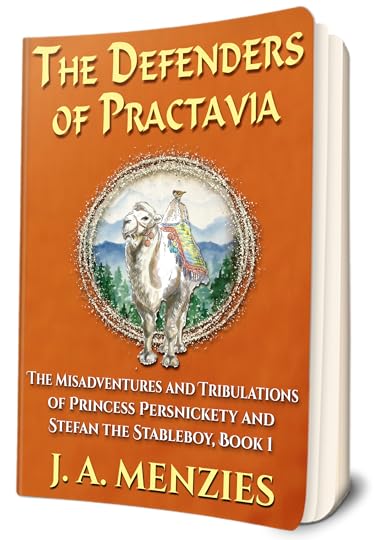 Anything else you’ve done over the last few years other than read, watch some television, and go for walks?
Anything else you’ve done over the last few years other than read, watch some television, and go for walks?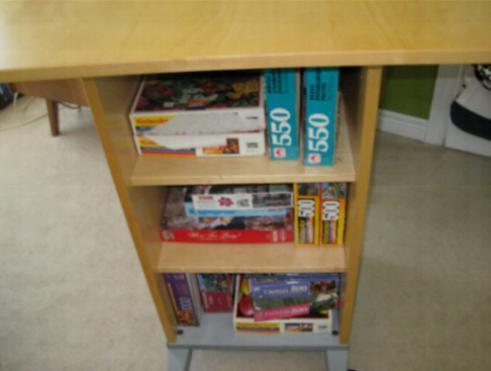
I usually have a 1,000-piece puzzle on the go. Years ago, with a little help from Ikea, Les and I made a puzzle table so I could stand to do them.
I do 500- to 1000-piece puzzles that I find interesting and that aren’t overly difficult because that activity seems to use the logic part of my brain, and free up my creative brain to come up with new ideas for my stories, etc.
But in the past four years, I haven’t done nearly as many puzzles as I normally would have.
One randomly strange thing I did was to buy some Lego for myself. What happened was that I bought the Lego bookstore set for myself for Christmas, 2021, after buying it for a gift for someone else.
My sons loved Lego when they were young (and some of them still love it). Same with my grandkids. But I didn't have it when I was young, and I was never really interested. However, the bookstore interested me.
I kept it in my bedroom and would do a few pieces each night to make it last. I think I found it easier than the jigsaw puzzles because I didn’t have to search very hard for the pieces. And then I bought the “Assembly Square” this past May when I was looking for a gift for one of my grandsons.
They're both still sitting on top of a shelf unit in my bedroom.
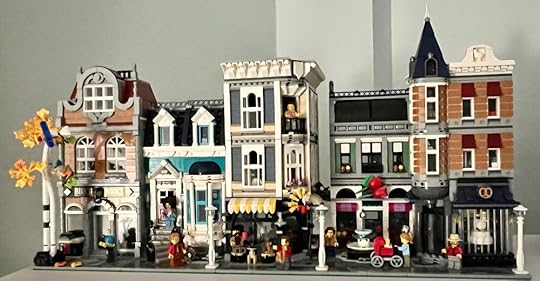
As for television, after my surgery back in 2018, Les and I began watching shows we both enjoy during supper. I mean, we can see each other throughout the day, so it isn’t as if we need to converse while we eat. We tend to watch series, a lot of which are mysteries on Acorn or Britbox.
(For anyone who is interested, I decided to make and post a list of shows we've enjoyed separately.
What have you missed the most over the last four years?Curiously enough, our youngest son had bought the Pandemic Legacy Season 1 game for us back in 2016 or 2017, and we played it whenever he was up, which was usually Easter, Christmas, and Thanksgiving. (It’s a game you only play once, but in steps). The last time we played it was Christmas of 2019 and my brain was barely there. We were almost at the end, so maybe one of these days we can finish it. The funny thing is that in a way, that game kind of prepared us for the ups and downs of the Covid Pandemic.
Les and I also have a bunch of other games, like Ticket to Ride, Splendor, Carcassonne, Dominion, and Rivals for Cataan as well as older games like Rook, Sequence, Perquacky, Crokinole, and Scrabble. But we've barely touched them because my brain just wasn't up to it. (FYI, I just spent five minutes trying to remember the name Scrabble.)
But what I miss the most is being with the rest of our family members. All of them, but especially the younger ones. I miss reading books to them, playing games with them, helping them do harder and harder puzzles, taking them shopping or to Legoland, an Escape room, or to get ice cream cones. I’m the one who usually organized our outings or our time with them, and while Covid has made it hard, I know that if I’d had any energy or brain at all we could have managed to do more by Zoom, etc.
Did you ever think you might die?For sure. I know breast cancer is one of the primary causes of death among women. Many years ago, I had a very close friend who had breast cancer. In her case, she had a mastectomy, but it wasn’t enough. We weren’t living near each other, but I was able to talk to her a few times. We thought she’d be okay, but then one day she felt unwell and they discovered it had emerged in several places. She died a few days later. So, I have definitely thought about the possibility that it is just waiting to pounce again, or that it could appear in a different form.
Since I was diagnosed, several friends of mine have had a similar diagnosis, and not all have gone as well as mine. Plus, we have other friends and several family members who have had or who have cancer right now.
But at the same time, I could have a heart attack tomorrow or get hit by a car when its brakes fail while I’m crossing the road.
All that to say, as long as we live on earth, we are prone to the consequences of being alive. We still don't know what causes many types of cancer, or why some people are impacted and others aren't. And I don't believe for one minute that God gave me cancer. But I do believe that God can make all things, even terrible things, work out for good. And my memory of trusting God to take care of me actually goes back to one day when I was four and discovered that I was adopted. I won’t go into detail here because I have a blog about it.
And I also have a blog about the day our first son was born when I actually thought I was going to die.
So, as we approach the end of 2022, how are you feeling today?What I’ve been finding since this summer is that I have a few days when I feel that I am almost “normal me,” with both energy and a working brain. And then I’ll wake up the next morning and be very tired. No energy at all. But I think the number of consecutive days when I have energy and a brain seem to be gradually increasing. And I've learned not to push it when I don’t have energy or a brain.
I’ve been able to get some things done in our garden (where I can tell our two oldest grandsons what to do). And I’ve recently repotted my house plants (which really needed to be done!)
I’ve been able to talk “books he should read next” with our oldest grandson and actually come up with the author names I’m looking for.
I’ve been able to envision what I want to accomplish in the next few months and actually do some work on it.
And, since it’s NaNoWriMo (National Novel Writing Month) as I write this, I’ve set myself a goal to write something every day. Not one particular thing, but this blog post for starters, the prequel for my fantasy (which is now done), and as much as possible of the first draft of my second fantasy novel.
Hmm. Now that I think about , I've actually been able to think reasonably well and write and/or edit something every single day this month. And I can't recall a single day that I've considered staying in bed. Wow! That's definitely the longest stretch I've gone since before I had cancer. So maybe things are clearing up.
Anything else you'd like to add?Right now, I'm basically taking it one day at a time, trying to focus on two or three things each day, and living in the moment rather than worrying about what I'm not getting done.
Writing this has also made me think about swinging into my "teacher" mode to write a post about how to make sure you do the most important things when you have chemo brain (or brain fog). Things like taking your pills on time, and remembering to water your plants, and remembering what you wanted to write that day.
Oh, one more thing. This past Tuesday, I met my new oncologist (my first one moved away shortly after I saw him this spring) and she seems very nice. She convinced me to have another zoledronic acid injection next week. I really, really hope that doesn't derail my current ability to think and to write. I'll let you know.
The post Why I More or Less Disappeared in the Fall of 2018 and What I’m Doing Now – Part 2 of 2 appeared first on N. J. Lindquist.
November 16, 2022
TV Series We’ve Watched Over the Last Four Years (and Recommend)
When I got breast cancer 4 years ago, Les and I began watching TV during supper. I mean, we can see each other throughout the day, so it isn’t as if we need to converse while we eat. Since it was relaxing, it was a good use of time.
Note: I bought us some aprons so we don't spill food on our clothes. Turned out to be a great investment.
And when Covid arrived just over a year later, our need to stay safe increased the need for us to have some easy-to-access light entertainment. The world is scary enough right now, so we (okay, I) tend to choose the kind of shows that are relaxing.
We mostly watch series, primarily on Acorn or Britbox, but some on Prime, Disney, etc. We tend to subscribe to one network at a time, watch everything we want to see there, move on to another one, then rotate back as new shows or new seasons come out.
Both Acorn and Britbox have a lot of the more traditional British-style whodunits, and there are also lighter shows. So we might watch a heavier mystery and then a lighter one. Or a mystery and then a comedy.
Mysteries we recommend - (from heavier to lighter)VeraShetlandGraceThe BayThe Chelsea DetectiveMcDonald and Dodds Hetty Wainthropp InvestigatesRecipes for Love and MurderThe Brokenwood MysteriesPoirot, Marple, and anything else by Agatha Christie Midsomer Murders My Life is MurderMiss Fisher’s Murder MysteriesFather BrownShakespeare and HathawayJonathan CreekPie in the SkyMurder in SuburbiaDeath in Paradise Comedies That Aren't MysteriesDoc MartinKate and KojiThe Other One As Time Goes By All Creatures Great and Small (newest one)The Vicar of DibleyA Fine RomanceSchitt’s CreekTed LassoI'm sure I've missed a few, but those are the ones that came to mind from the past four years.
Note: If there's a series you've enjoyed that you think we might like, please add it in the comments.
The post TV Series We’ve Watched Over the Last Four Years (and Recommend) appeared first on N. J. Lindquist.
Why I More or Less Disappeared in the Fall of 2018 and What I’m Doing Now – Part 1 of 2
In mid-August, I got a post card reminding me that it had been two years since I'd had a mammogram and I needed to make an appointment for one as soon as possible. We were getting ready to go on a three-week holiday to Newfoundland and Nova Scotia in late September, and I still had a lot to do before we left, so I almost ignored it. Fortunately, I decided to call and get it over with, and I was able to get an appointment that week because someone else had cancelled.
A couple of days later, I got a call for a second mammogram and an ultrasound. After that appointment, I met with a doctor who told me there was a small lump, and I’d need to have a biopsy to find out what it was. I won’t go into the details here because I've blogged about it earlier, and actually won an award for the post. Suffice it to say that the lump, which was quite small and soft (neither I nor the surgeon could feel it), was cancerous, and after I returned from our holiday, I had surgery and later met with both the surgeon and an oncologist to get the results of the surgery.
The surgeon said everything went well, and there was actually a very good chance that the lumpectomy had eliminated the cancer, but I might need a “pill” and radiation to be safe.
However, the oncologist I saw a few weeks later told me the cancer was aggressive (triple-negative), and he recommended chemotherapy and radiation. He didn’t push me, and I could have declined and taken my chances, but I felt I needed to do everything I could to make sure the cancer was really gone. So, it was on to four months of chemotherapy followed by a month of radiation.
(NOTE: IF YOU ARE A WOMAN, A MAMMOGRAM IS YOUR BEST FRIEND)
When you chose to go ahead with the chemotherapy, did you know what the side effects might be?Intellectually, I did. I mean, I read the long list of possible side effects, from hair loss to fatigue to much worse things. But unless you’ve experienced it first-hand, either yourself or with someone close to you, you don’t really know, do you? My dad died from lung cancer, but by the time they caught it, they weren’t able to do anything except keep him comfortable (which he was). So, no, I really didn't have any idea what it would be like.
What was it like when the chemotherapy began?Honestly, for me, from the moment in early November when I first learned I had triple-negative breast cancer, I seemed to move in a sort of alternate universe. Perhaps it was a form of "fight or flight" response. I chose to fight; but I also realized instinctively that it was my fight. And if the oncologist thought my best chance was to have the chemotherapy, then I’d do it. To be honest, I consider myself a realist, but I think I lean toward being an optimist. I rarely expect the worst to happen.
I knew the doctors and nurses would do their part. And my husband and other family members would do everything they could to look after me. Plus, I knew there would be people praying for me. But, ultimately, it was my body that was caught up in the actual battle. Doxorubicin and Cyclophosphamide are both heavy-duty drugs with a lot of side effects, and I would be the one experiencing those side effects.
In the beginning, my energy went into preparing for the chemo. Not just making my bedroom comfortable and welcoming (see the above picture), but also thinking about what I was currently working on and what I'd be able to delay or discard. I prepared for the worst as much as possible, and we told our family and friends and colleagues what was happening so they wouldn't be surprised.
How did the chemo affect you in the beginning?Once the chemo started, my energy seemed to drain right out of me. Each day became one of simply surviving—taking any medicines or vitamins I needed, eating well, going for a short walk (even if it was in the house), and maybe, if I had a working brain, doing a little writing.
I watched some TV (mostly curling, basketball, and British mysteries), but for the most part, I found it easiest to read. And I read hundreds of books. Most of them I bought for my Kindle because I often found myself awake in the night and a Kindle or Kobo reader is great for day or night. You can read it in bed, while you eat, in the bathroom, while getting the chemo—literally anywhere.
But I also borrowed lots of books from my local library, some as paperbacks or hardcovers but I also discovered Libby and Hoopla have eBooks that are available through our library. I read those on my iPhone or iPad.
How did you and Les manage during this time?Well, mostly he kept me alive. He made all the meals, did the dishes, vaccuumed, drove me wherever I needed to go , did the shopping and so forth. I did do my own laundry. (I should add that he's been doing the cooking and grocery shopping since 2001.)
Our older two grandsons always need money, so they did some of the cleaning and yard work.
What was your biggest issue during this time?Being tired. Like, all the time. Waking up tired. Brain fog was there, too. I’d forget names of things I used all the time. Instead of “can opener,” I’d say, “thingie you use on cans.” Stuff like that. I'd start doing something, get distracted by something, and completely forget what I was doing.
But mostly it was fatigue. No energy to even try to do anything that required me to focus. I would think of something I “should” do, and then I’d reject the idea because I had no energy to even think about it. Or I’d think about it and even think about the steps I’d need to do. Like I should send X an email. So, I’d need to:
Get up Go to my computer.Think about what to say.Open my Outlook.Find their email address.Write somethingAnd most days, it ended right there. I had no energy to even think about what to write in an email never mind writing it. As for phoning someone? No way.
Were nights better or worse than days?Mostly, they were just different. I was often awake in the night. Like, wide awake. But there was no way I was getting up. I’d just read until I got tired enough to go back to sleep.
Because of that, and because Les has always needed less sleep than me (he’s always gone to bed later than me and gotten up earlier), he moved into the next-door guest room and used our main bathroom. That way, neither of us woke the other one up. And he’d hear me if I called him. He also kept the phone in his bedroom so it wouldn’t wake me.
Was it frustrating when you were awake at night?Not usually. When I woke up wide awake, I’d just read until I became sleepy.
The biggest change was that I went from going to bed at around 11:00 p.m. to getting so tired I could barely keep my eyes open by 8:00 p.m., so I just started going up to get ready for bed as soon as I felt tired. And I might sleep later in the morning too. The thing is, as an indie writer who works from home, nobody was waiting for me to do something, so I was able to just basically stop pretty well everything I normally did and nobody was giving me a hard time about it.
To be honest, one of the best times of the day for me was the moment when I could slip into bed, all cozy and comfortable, knowing I had a good book to read until I became sleepy. And if I finished that one, I had many more. So, I never had to lie there worrying or being anxious.
Did you not want to take sleeping pills or anything to help you sleep?No, I’ve never taken a sleeping pill. If I had a headache or pain anywhere, I might take a Tylenol. Even regular strength ones make me sleepy. Extra-strength makes me very sleepy.
Did you learn anything about yourself during this time?I learned a very unexpected thing. I've honestly always believed that I could only read one book at a time, and that I had to finish it before beginning the next one. I guess the exception was when I was in university reading books on various subject matters through the year, but I never really thought about that as “reading a book.”
Now, however, I often found myself with two or even three books on the go. Paperbacks were for the day and eBooks during the night. I might have at one book open on my Kindle, another on my iPad, and then a paperback.
Most of the books I read were mysteries or fantasy, because that's what I enjoy. But there were heavier books, too. At the end of 2020, I even posted a blog with 10 of the best nonfiction books I'd read in 2019-2020. (Hmm. I need to do another one of those this year.)
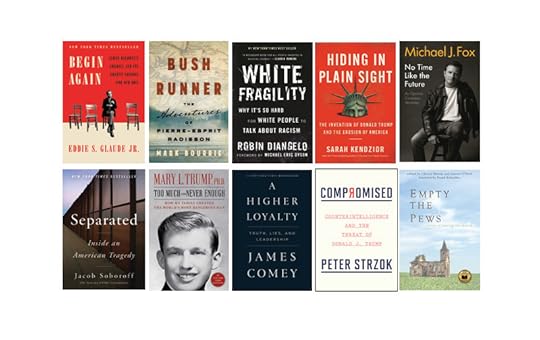 You said no one was waiting for you to do anything on a daily basis, but there was one big thing, wasn’t there? A book you had planned to edit and publish?
You said no one was waiting for you to do anything on a daily basis, but there was one big thing, wasn’t there? A book you had planned to edit and publish?Les and I had published our first Hot Apple Cider book in 2008 in a unique partnership with World Vision Canada and The Word Guild, a Canadian group for writers that I co-founded (along with writer and editor Wendy Elaine Nelles and my husband, Les). The book, which was edited by Wendy and myself, was a huge success, and in 2011 we published A Second Cup of Hot Apple Cider with the same partnership.
That book was followed a few years later by Discussion Guides for the first two books, A Taste of Hot Apple Cider (2014), Hot Apple Cider with Cinnamon (2015), and Christmas with Hot Apple Cider (2017), all of which I edited and Les and I published on our own.
I had done a cross-Canada “Christmas” bookstore tour in the fall of 2017, meeting up with many of our contributors along the way, and the book sold well. Consequently, early in 2018, Les and I decided to go ahead and publish a sixth book. By the time my cancer was discovered, we had already begun reading submissions.
I knew we'd be disappointing quite a few people, but I soon I realized that while I could follow what I was reading, there was simply no way I'd be able to do the level of editing required for a new anthology any time soon. It was hard to tell everyone who had sent in stories that we weren't going to be able to use them at this time, but it was actually a relief to know I wouldn't have that hanging over my head.
You were also blogging, right? Were you able to keep that up?Yes. I’d been blogging a memoir each week about my childhood. I did write some posts about the cancer (partly so I'd keep it straight for myself). The first one actually won an award, which I received in June of 2019 (see photo above). However, the memoir I'd been blogging weekly came to a halt with only a half dozen or so posts to go.
I eventually realized that the problem wasn't just that I lacked the energy. It was a lot of work to do the research and organize all the details necessary to write the posts. And at that point, I just didn't have the brain power to do it. I've always been a multi-tasker and I've been able to jump from one thing to the next and keep all the details in my head. But, now, I was struggling just to remember if I'd taken my vitamins that morning.
(Note: weekly/daily pill organizers and iPhone daily alarms are wonderful! Assuming you actually take the pill when the time alerts you and don't just turn it off and forget what it was for.)
I had also started a couple of newsletter posts for fans of my books, and I just basically gave up on those, too. I didn’t know if I’d ever write another book, so what was the point in pushing myself and using the little energy I did have to try to hang on to my readers? And to be honest, at that point, I really didn’t care.
During this time, did you feel guilty for more or less disappearing?After the first few weeks of basically hiding in my cocoon with my books, I did begin to feel a bit guilty. But then I stopped.
The thing is, I've always been a ridiculously busy and fairly efficient person. (Some might even say driven.) I’m a natural organizer. I see the goal and I see the steps that need to be taken to meet that goal. It’s not forced. Ask me about almost anything and I can come up with a step-by-step plan. Carrying out the plan is another story, of course, but if it’s something I truly believe needs to be done, then I will do it no matter what.
The other thing about me is that I care about people and want to help them, but my go-to method (aside from organizing an action plan) tends to be that of a teacher. My entire life, my first instinct when I’ve learned something new is to tell someone else.
But I truly felt this voice inside telling me that if I never did another thing except stay in my room and read, I’d have done enough.
What did you think that meant? That you’d “done enough?”For my entire adult life, I've had people tell me they have no idea how I do everything I do. Well, I’ve never known how I did everything I’ve done, either. And to be honest, looking back, sometimes I have trouble believing all the things I've done.
One example: In April of 1980, Les and I moved from Regina to Mississauga with an almost-4-year-old, a 2-year-old, a 6-week old, and a 6-year-old miniature poodle. I'd had a C-section for each of the kids, including, of course, the 6-week-old.
We didn't know a single person in Ontario. Les was working for IBM, so he would be busy every weekday as well as doing a fair bit of travelling to western Canada and the US. So, a lot of the time, I would be pretty much on my own with the kids.
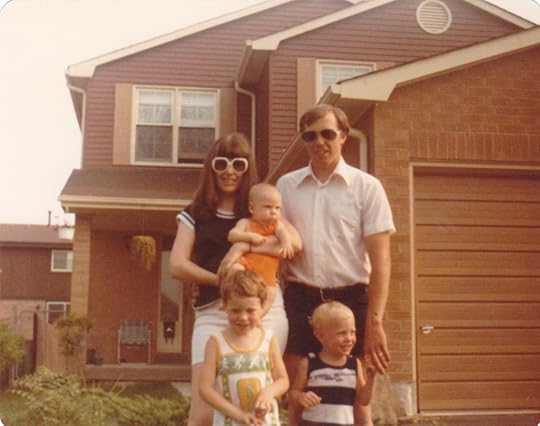
Our family in front of our new home, May 1980.
What were we thinking? We believed we were supposed to make the move. IBM had offered the new job, which came with a promotion, and then we'd discovered that the denomination of the church we'd been helping to plant in Regina was going to be planting a church in Mississauga, so we chose to accept the move even though it meant leaving all our family and friends behind.
We'd actually lived in Toronto for six months when Les first started with IBM. At that time, they had a training program for new staff. And the truth is, we'd loved the multi-cultural aspect of the city as well as the profusion of trees and flowers. So we weren't totally going in blind. But, still, it was a huge move.
Anyway, Les had flown down to Toronto just before Christmas and bought a house. He took pictures so he could show us what it looked like when he got home. (This was in the pre-internet days.) When we arrived in late March, we discovered there had been some damage from burst pipes. But other than that, the house was fine. And because of the water damage, insurance paid for the living room, hall, and stairway to be repainted and for new carpets to be put in, so that actually turned out well! Over the summer, Les finished the basement so the kids had a playroom. And that fall, we became part of a 4-family church-planting team. (No, none of the others had young kids.)
As part of the church plant in Regina, Les had been a deacon, and I'd been overseeing Sunday school, leading a women's Bible study group, and co-leading an adult Bible Study with Les up until the week we moved. Plus having people over for Sunday lunch or other activities quite often. We basically moved into similar roles with the Mississauga church. Please don't ask me how I managed. I just seem to have enjoyed filling every minute. And although my roles have changed over the years, I've always been busy with more than one thing. I guess I just enjoy being busy.
All this to say that one night in the spring of 2019, when I had been reading but was still awake, I realized that I should feel absolutely no guilt if I did nothing but read mysteries or do puzzles or watch TV or sleep for the rest of my life because I'd already done far more than many people do in a lifetime.
I stopped feeling guilty and accepted that other people could manage without me. Programs could manage without me. Books could get written without me. Even my family could survive without me.
Eventually, you did start to have a bit more energy, right?My chemotherapy treatments ended on March 22, 2019.
Then I had a short break, followed by 20 radiation treatments, which finished at the end of May.
Over the rest of that year, I very slowly began to feel more like what I call my "normal self."
It sort of felt like as my hair began to grow back, my energy and brain slowly started to come back, too.
Don't get me wrong. I still had a number of ongoing side effects.
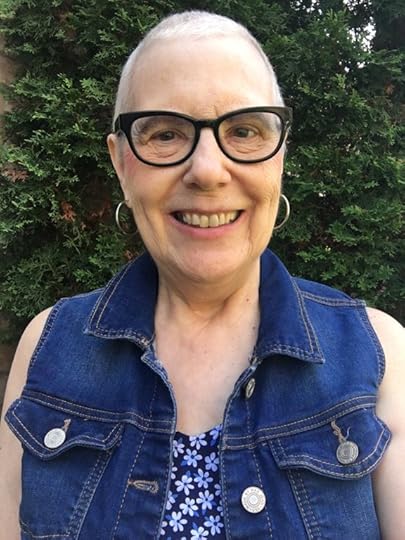
Me with my new hair, July 7, 2019
I had what I call “waves” of neuropathy which basically means cramp-like pain in my toes, followed sometimes by pain in my fingers, then pain in the area where the surgery had been, and then pain in my jaw.
I also discovered that anyone who has had breast cancer surgery really, really needs a good physiotherapist because the surgery (especially the loss of lymph nodes) causes all kinds of issues you might not suspect are associated. (I am fortunate to have a brilliant physiotherapist.)
But the biggest issues for me were still the lack of energy, the brain fog (also called post-chemo-brain) which was mostly forgetting names for words and things like that, and what I like to call apathy. I kept thinking of all kinds of things I wanted to do, from sending cards to people to organizing times to do things with our grandkids, but I simply didn't care enough to try to find the energy, which was non-existent anyway. I often found myself just ignoring everything and going back to reading my books.
Were you keeping up at all with what was happening in the world during this time?During the past 8 or 10 years, I’d learned that the media is often biased or missing part of the story, and that there was a serious absence of unbiased, investigative reporting. I’d been on Facebook, Instagram, and Twitter for enough time to find some people i trusted, so, now, when I wasn’t reading books, I was reading posts from those people and following more people, especially on Twitter.
I decided early on that the one thing I could do was try to bring attention to the voices of other people who I thought needed to be heard. I did it partly to encourage them and partly to try to get their thoughts heard by more people. And before you ask, yes, I read the thoughts of people I didn’t necessarily agree with, and of people whose words were painful because they pointed out things I could do better. (See some of the books in the above list.)
Beginning in October of 2019, I did manage to write three blogs with some of my own thoughts, but they took a lot of time and energy, and a lot of editing help from Les. I set them into a new area of my website, called “From My Perspective.” https://njlindquist.com/blog/from-my-perspective/ ???There are many more posts like this I’d like to write.
Maybe one of these days….
I believe that one other thing happened in December of 2019, but to Les, not you?Yes. Les had noticed on his Fitbit that his "resting heart rate" was getting lower and lower and lower (from 64 to 36 over a three-week period). Our GP sent him to a cardiac specialist who did some tests and diagnosed atrial flutter.
Les ended up getting an ablation on December 4th. In his words, "There were places in my heart that were short-circuiting, and they cauterized those places to stop the short-circuiting." The good news is that it fixed the problem.
More good news was that I had enough energy and brain to drive him to Newmarket and back and look after us both for a few days.
I'll end Part 1 of this post with a photo of myself on Christmas Day, 2019, with our youngest grandchild. (Note my crazy hair!)
To Be Continued....
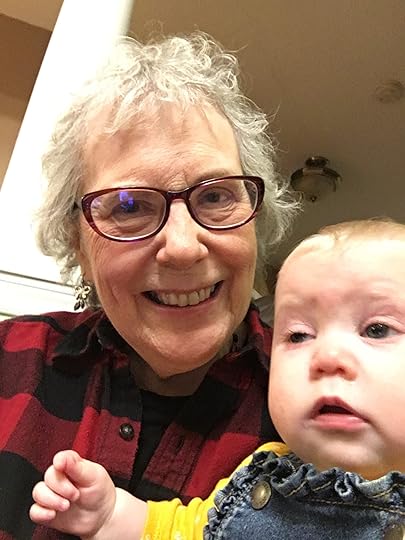
The post Why I More or Less Disappeared in the Fall of 2018 and What I’m Doing Now – Part 1 of 2 appeared first on N. J. Lindquist.
October 28, 2022
Why Didn’t They Ask Her?
Outside the Gate: The Inspiring True Story of an Orphaned Girl Who Survived the Abusive Canadian Foster System
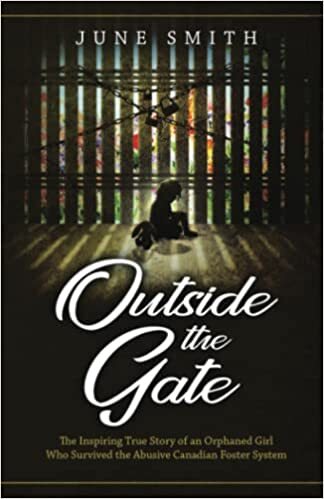
I've reviewed a number of books about birth mothers and adoption. This book is similar in many ways, yet different. It's about a young child who was forcibly taken from her mother and put into the foster child system, where she was never given the chance to be adopted by a loving family.
A friend of mine, who was herself a foster child before being adopted, gave me the book. I started reading it late at night and finished it the next morning. It's pretty much impossible to put down.
As an adopted child myself, I can relate to a few of the things she talks about. But my life was pretty much ideal in comparison to hers, which reads like something out of a Charles Dickens novel. And yet, I have no doubt that many of the things she refers to happened to many children in the past and still happen to many children today.
Outside the Gate is written from the viewpoint of a little girl who survives the many abuses that come her way.
The storyteller, June Smith, was four years old and living in Toronto when she and her six-year-old brother were taken from their cold, dingy basement apartment by child welfare workers, separated, and made Wards of the Crown by the Canadian Child Welfare System. (The picture above is of June and her brother Freddie at 3 and 5.)
June was declared an orphan and sent to an orphanage for young girls. She was safe there, at least for a time. And her memories of that happy place and one of the women in particular helped her through the worst times. But she had no idea what was happening to her or why. And she longed for her brother, who had been her constant companion.
When June was seven, she was deemed old enough to be put into a foster home, and her life changed again.
First there came the inspections. Later came the foster homes she was placed in, neither of which should have passed a responsible inspection.
Eventually, afraid for her life and trying to protect herself, this sensitive, intelligent little girl was declared "incorrigible."
What bothered me the most throughout the book was that no one ever explained anything to June about what was to happen or why. And when she tried to explain what was happening to her, she was either ignored or talked over by adults who thought they knew better, or perhaps just didn't care. No one listened to her. It was all threats. "Do this. Don't do that. Or else."
I found this lack of communication horrendous. As a mother, I explained everything to my kids as they were growing up, whether they were old enough to fully understood or not. I believe that when a child understands what's happening and why they should or shouldn't act in certain ways or say certain things, and when they can ask questions and give their opinions, they not only grow in their understanding, but they learn to trust. When they're simply given rules and threatened if they disobey, they learn to hide their emotions and either pretend to agree or become bullies themselves.
Incredibly, June survived, and her story has a happy ending.
The book is also very well written.
I highly recommend Outside the Gate to anyone who has children, works with children, or struggles with memories from their own past.
Check out June's website. https://www.outsidethegate.ca
The post Why Didn’t They Ask Her? appeared first on N. J. Lindquist.
October 18, 2022
Hair Loss, Breast Cancer, and Me – Part 6
(If you missed the previous parts to this story, you can find them here.)
I knew that the most likely first side effect from the chemo would be the very visible loss of my hair.
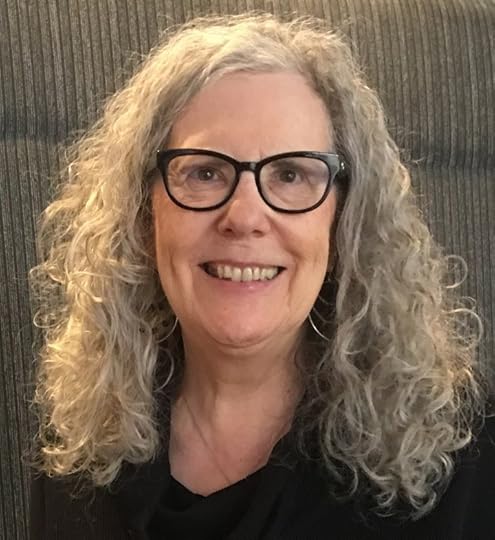
Me a few weeks before the first chemo. My hair was actually grey although this light added orange tones.
A week after the first chemo, I was stunned to discover that the fleece tops I wear for warmth during the winter were covered with long grey hairs. Yikes!
I knew it was going to happen, but I guess I didn't expect it to happen quite that fast.
I'd done my research ahead of time and I knew there were basically four options: Buy a wig that was as close to my actual hair as possible. Buy one or more wigs in any style and colour I wanted. Go bald. Get some kind of temporary headwear - hats, scarves, etc.I knew that my hair would likely (hopefully?) start growing back in shortly after the chemo ended, and since I had no plans to do any speaking or be in the public during the chemo, I saw no need for an expensive wig.
My mother wore relatively inexpensive wigs for years when she was older, and they really did look good on her, but I'd tried them on and I knew having a wig on my head all the time would drive me crazy.
A friend had loaned me a few caps she'd used; however, she'd needed them during the summer and they weren't particularly warm. Since I'm always cold anyway, I needed warmth!
As for just going bald, if it had been summer, I might have done that, but definitely not in the winter!
Since I didn't own any scarves that would work, and I had no idea where to go to buy some (and no energy to do so), I ordered a couple of caps from Amazon that said they were for chemo patients.
I was supposed to have my second chemo session on December 20th, but after seeing the results of my bloodwork, my oncologist decided to wait another week. Which was fine with me!
I was booked for December 26th, which meant I'd be much more likely to enjoy Christmas Eve and Christmas Day with our family.
Meanwhile, my hair was still coming out.
I cut a couple of inches off.
A few days later, I cut about about four more inches off.
On Christmas Eve morning, with our family coming over, I cut off a bunch more.
I was hoping no one would notice my hair loss because I hadn't wanted to bring attention to me. I just wanted things to be normal for the kids.
But I'm not sure it worked.
This photo was taken on Christmas Eve - not quite 3 weeks after the first chemo.
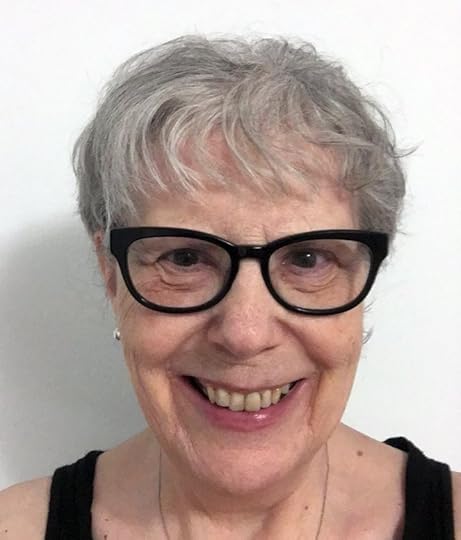
Me with very little hair left.
So on Christmas morning, before we went to our oldest son's home to open gifts, I bit the bullet and used an electric razor to shave off the rest.
My ever-helpful husband told me I had a nicely-shaped head for being bald and I should go with it.
I said, "Thank you, but my head is freezing!"
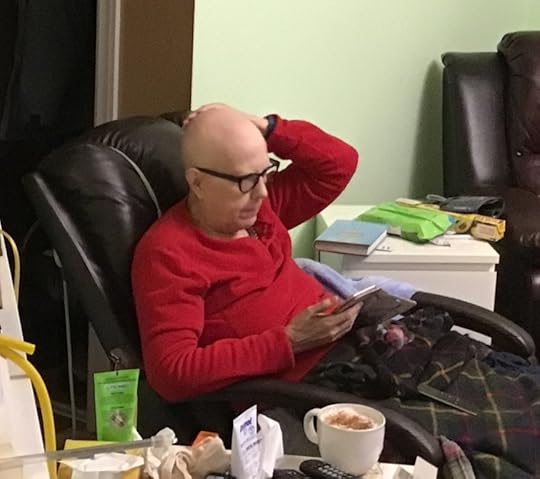
Christmas morning, 2018, before going to our oldest son's house
A small plain navy cap had arrived from Amazon just before Christmas, so I wore that. I don't recall that anyone, even our youngest grandkids, commented on it.
(By the way, I'm holding a sloth my oldest granddaughter bought to keep me company during the chemo and radiation. It's still in my bedroom.)
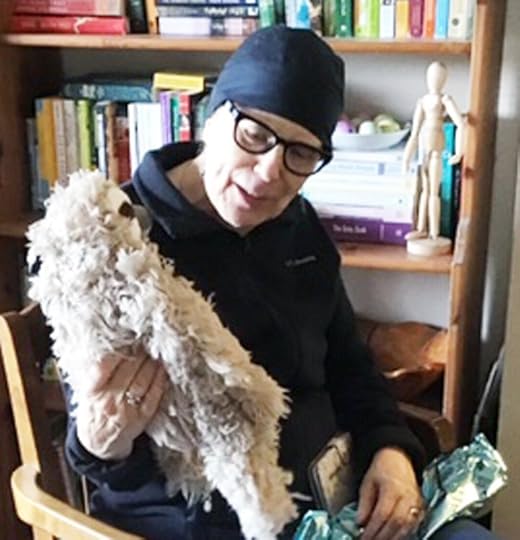
Christmas morning, 2018, at our oldest son's house
I had my second chemo treatment the next day. Our third son's wife had bought three beautiful silk scarves for me for Christmas. I found a Youtube video and managed to get one of scarves tied on so it would stay, and I wore it. That scarf got so many compliments from the nurses!
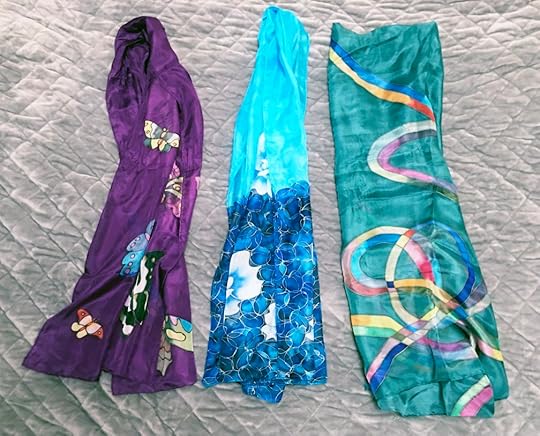
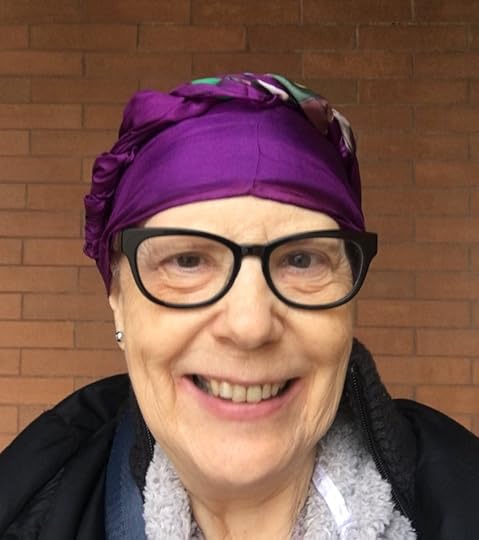
Below, you can see all the caps I ended up with. A few were for sleeping (had to keep my head warm, remember?), the rest were for day wear, and the silk scarves were for "good." I even found a plain cap with a place to add a scarf!
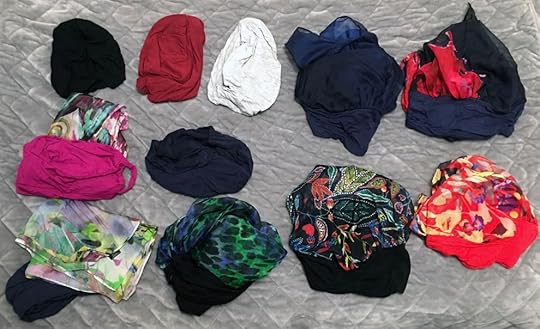
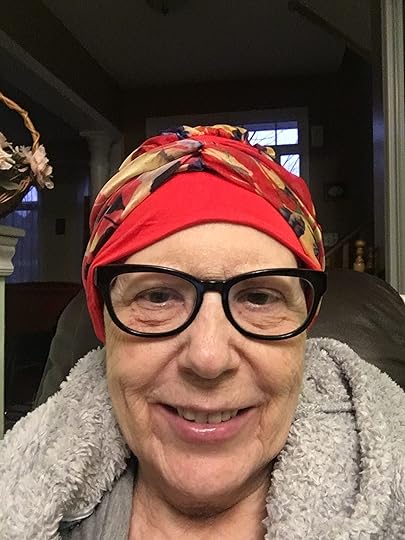
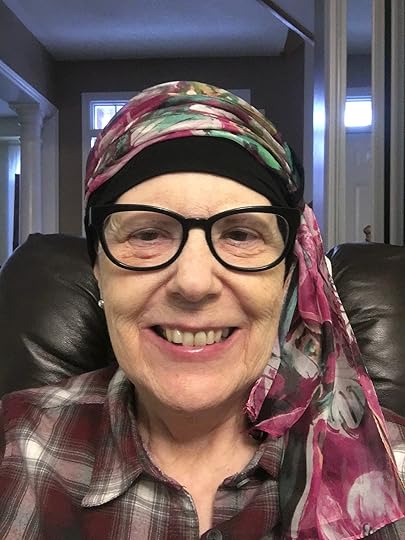
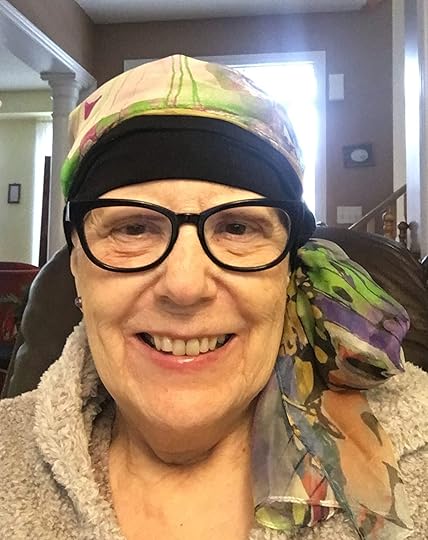
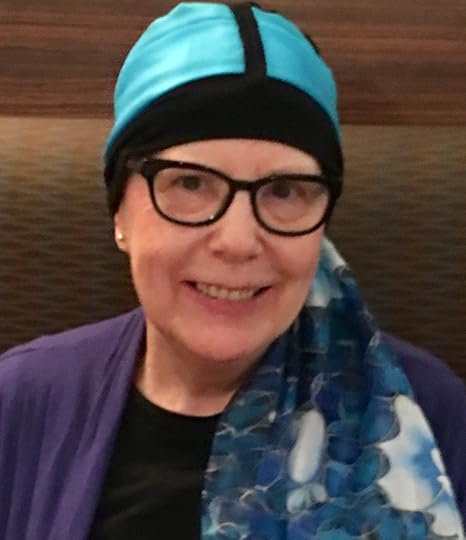
The best cap for sleeping at night (because it didn't come off easily) was one I was given later at a "Look Good, Feel Better" event that was held at the hospital. What made it stay on was the strip of elastic at the back. There's no label, so I wondered if it was made by someone from the organization.
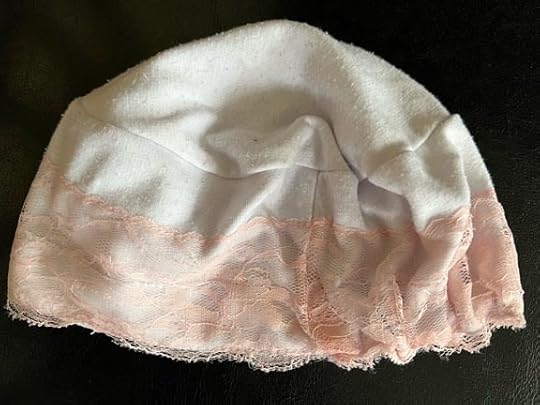
This sleeping cap kept my head warm at night and stayed on perfectly!
A note about the program, Look Good, Feel Better.
The workshop I attended was held at a room in the cancer treatment area of our local hospital. As far as I know, the women leading it were all or mostly volunteers. They talked about things like what to expect after breast cancer surgery: hair loss, wigs, skin problems, depression, and so forth.
I found out about it a couple of months after starting the chemo. It would have been better to attend before the chemo started, but I only found out about it because another cancer patient mentioned it to me. Turned out there were brochures in the chemo waiting room, but I hadn't noticed them. When I asked my oncologist if he'd heard of the organization, he hadn't. But he did get his receptionist to get some brochures to put out at his office.
In many ways, I wasn't their target audience because I really don't wear make-up and wasn't all that bothered by the hair loss (as long as my head was warm!)
But they did talk about a variety of things such as skin care during and after chemo treatment, and how looking good would make you feel better. There was a kit for each woman with brand new make-up suited to her skin type. And each cancer patient got a make-over using the new make-up.
Being me, I mostly felt guilty because opening the make-up and using it on me meant that I would likely have to throw it out because I rarely ever use make-up unless I'm on TV, speaking, or getting my picture taken. I do use a face cream morning and night but other than that, a bit of blush and powder is pretty well it and I already had my favourites. I did use the eyebrow pencil because eyebrows, being made of hair, also disappear.
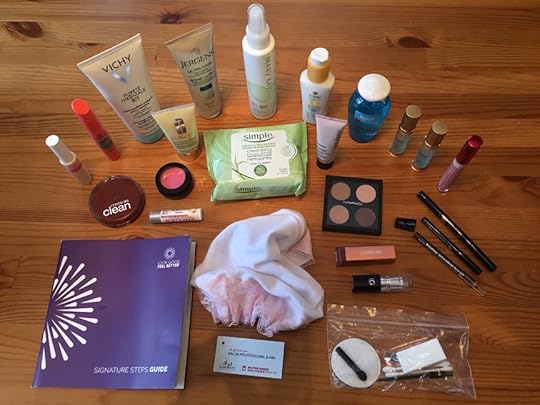
Anyway, I enjoyed the evening, and had some questions answered. Plus I got the great night cap!
Also, you get to take a person with you, so I took along the daughter-in-law who had bought me the scarves, and she enjoyed it.
Of course, this isn't all the organization does; just my limited experience. Look Good, Feel Better is actually 30 years old and world-wide.
If you or someone you know has been diagnosed with cancer, I'd encourage you to find out if there's a workshop in your area.
https://lookgoodfeelbetter.org/programs/
As for my hair, after the last chemo in late March, it slowly began to grow back.
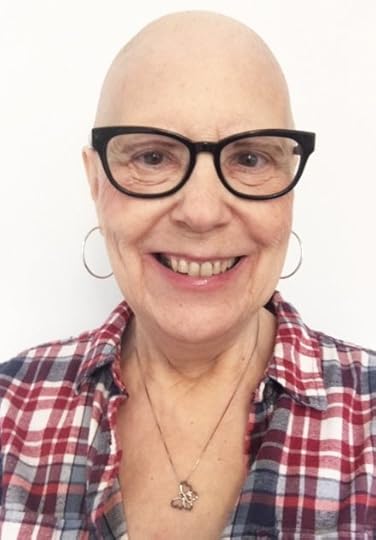
Bald me, January, 2019
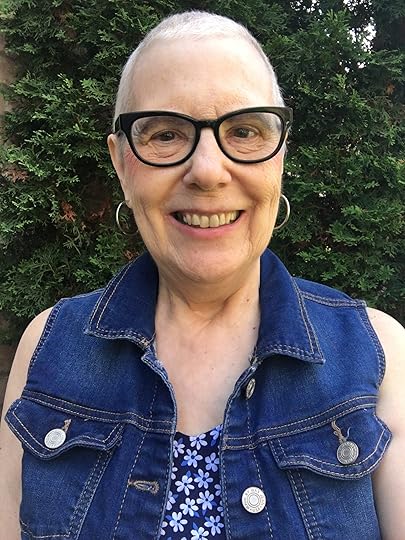
June, 2019
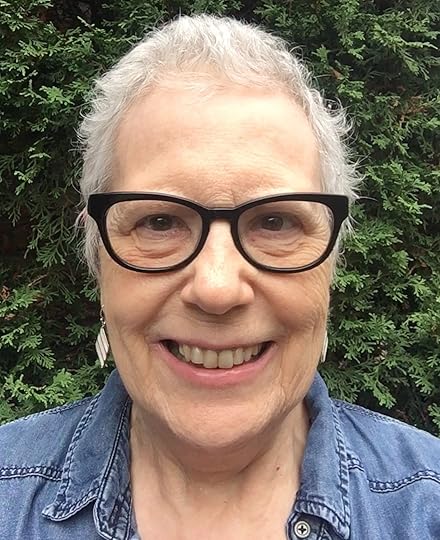
September, 2019
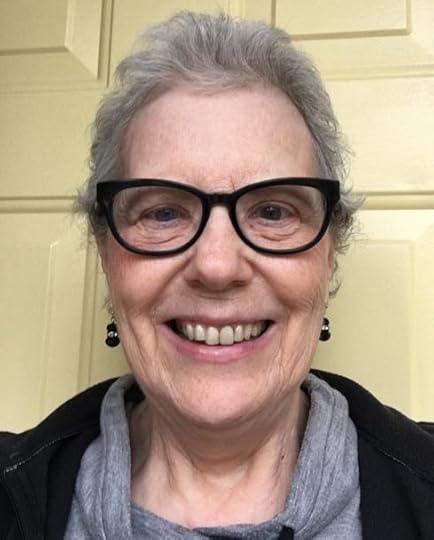
November, 2019
How Do I Feel About Losing My Hair?Even for a short time, losing it was a strange experience. But not necessarily a bad one.
The truth is, my hair has always been a bit of a stress point for me. Growing up, my hair was a point of contention between my mother and me. As I've written here, she had very fine, straight hair. She got perms and went to the hairdresser to have it "done," at least every other week, if not every week. My hair was nothing like hers. It was thick and it was always getting tangled. So she kept my hair short, and as I got older, always managed to convince me to keep it short. I didn't grow it long until after I'd graduated from university, and then whenever I washed it, I spent an hour under a hair dryer with my hair in huge rollers to keep it more or less straight. I was 50 when I discovered that I actually had curly hair and learned how to care for it properly.
My mother lived to be almost 90. One of the last things she said to me was, "Are you sure you don't want to cut your hair? It looks so much nicer short."
So when my hair was suddenly gone, I sort of felt that I was losing, not just my hair, but my beautiful curly hair. And I had no idea what it would look like if it did grow back in.
It took three years for my hair to get to the length it had been pre-chemo. As you can see by the last picture, today, four years after my breast cancer surgery, it pretty well looks the same as it used to. I stepped outside and took the last picture just now. No make-up. Washed it this morning with products for curly hair, wrapped it in a towel for a while and then did a bit of a blow-dry, and there it is. Happy as can be. As am I.
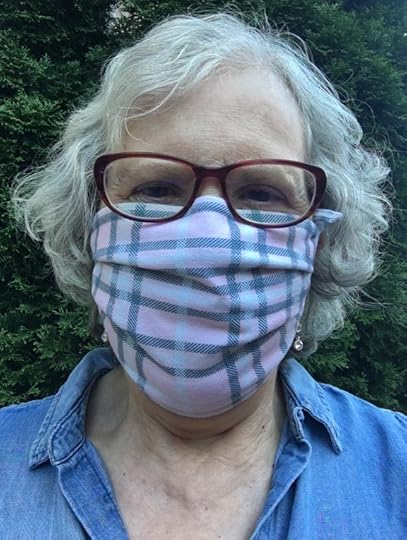
August, 2020
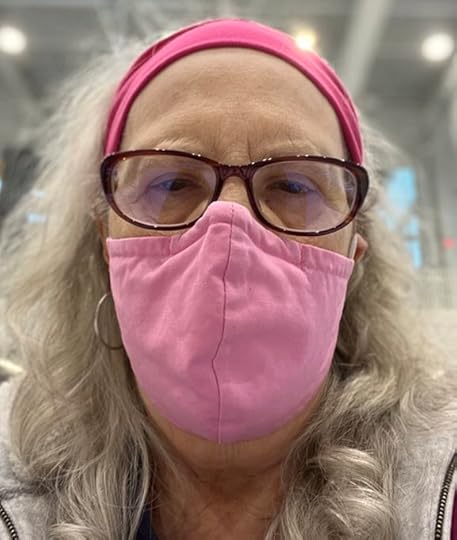
September, 2020
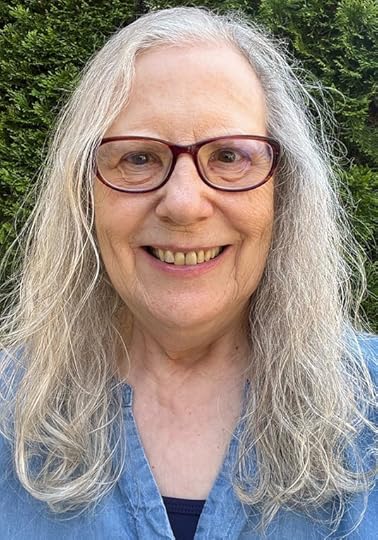
Dec, 2021
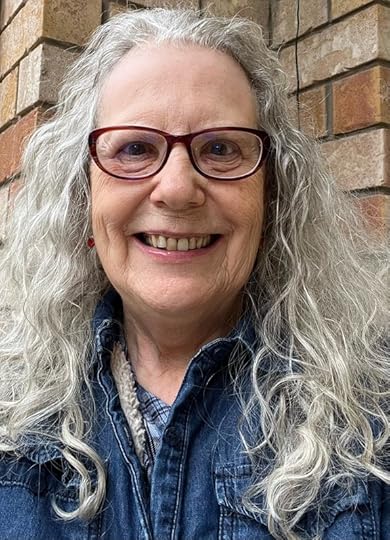
October 17, 2022
But even if it hadn't grown back, or if it had grown back patchy or straight, in the end, it's just hair. Yes, it's very noticeable. But it changes as we grow and it doesn't define us. I didn't feel any less of a person when I was bald, or when I wearing caps and scarves. Who I truly am is who I am inside my head; not what people see on the outside.
Sometimes I think I might have been a different person if my mother had let me have long hair when I was a teenager, the way my uber-confident older granddaughters did; the way my intense youngest granddaughter no doubt will. And then I wonder if that would have been a good thing. Because I'm actually quite happy with the person I am.
While I wouldn't go so far as to say I'm happy about it, in the long run I'm not sad about losing my hair because it made me aware of things I might not have understood before. And I wouldn't have experienced the pleasure of having my hair return to me.
But the hair loss was only the beginning and the most obvious of the side effects of my chemotherapy. The rest, most of which were (and still are) invisible to others, would turn out to be a lot more problematic.
The post Hair Loss, Breast Cancer, and Me – Part 6 appeared first on N. J. Lindquist.

